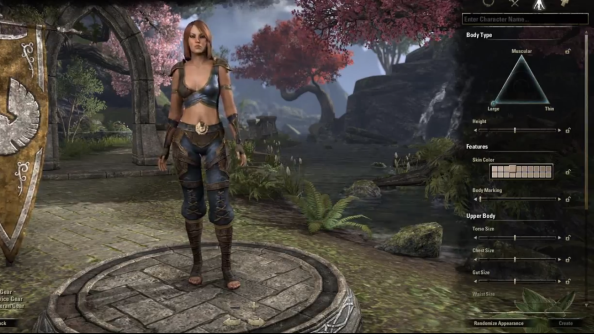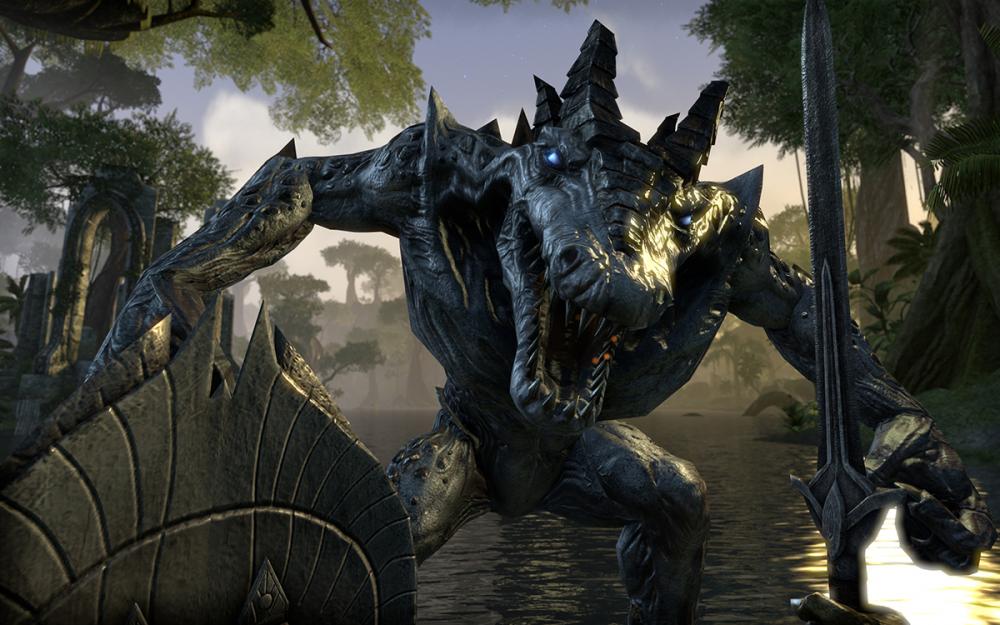Zohar Scourmont lowers himself to a crouch, his boots digging into the wet sand as he approaches the blind side of the guards. His attack must be perfect and swift if he wishes to survive the battle and rescue the hostage tied up in the tent. By the looks of it, one of the guards is a spell-caster, decked out in dark gray robes. The other an archer, with a strong looking bow strung across his back. Zohar slides silently into position behind a rock with plans of launching across it… right as three adventurers run past him firing balls of magic, swinging massive blades of steel and firing arrows with true aim. As they run pass the corpses they jump up and down and run full force into the next set of guards. With a sigh, Zohar walks behind them and waits his turn at the tent to save the hostage while the merry band of adventurers open every box and chest in sight then go running off again, jumping a lot.
This is what happens in the opening weeks of a new MMOrole-playingG and The Elder Scrolls Online isn’t any different. When a game officially launches, there is always a mad rush as if the game will disappear overnight with servers finding themselves overwhelmed and being pushed to the crashing point. No matter how hard a company tries to make an online experience with the depth of a solo player experience, it is always going to come up short. If the game is lucky and has legs, it might be able to overcome this adversity and get back to its roots but luck plays so much a part of it that most of them find themselves with LFG and LTS spam on the chat channel, no role-playing whatsoever and players with names l
ike “Deeznutz”. MMOs often face the ultimate test: Can they survive as a subscription-based game or will they have to fall into a F2P model?

Description:
It is a time of strife and unrest. Armies of revenants and dark spirits manifest in every corner of Tamriel. Winters grow colder and crops fail. Mystics are plagued by nightmares and portents of doom. Four years ago, in 2E 578, an arcane explosion of energy in the Imperial City set off mystical aftershocks that swept across Nirn. Mages died or went mad. Supernatural abominations from the plane of Oblivion, the Daedra, appeared in greater numbers than ever before. The constellation of the Serpent grew so large that it dominated the night sky.
So began the grand scheme of Molag Bal, Daedric Prince of domination and enslavement. His Dark Anchors, vortexes of evil magic, weaken the barrier between worlds, threatening to merge Nirn and Oblivion into a single, nightmarish hellscape. In the midst of this chaos, three alliances vie for control of the Imperial City and the White-Gold Tower. High Rock, Sentinel, and Orsinium stand as one, united under the rule of the High King in Wayrest. Valenwood and Elsweyr have forged an alliance of their own with Summerset, while Black Marsh, Morrowind, and Skyrim have formed a third, uneasy pact.
The Daggerfall Covenant. The Aldmeri Dominion. The Ebonheart Pact. Three armies will take up arms against the Empire, and against each other, to wrest control of the Imperial City and White-Gold Tower from the dark forces of Oblivion itself.
Where do your loyalties lie?

Hands On:
It sounds like an Elder Scrolls game for certain and I was excited to make my mark in this new story. The graphics are fantastic, the music fitting and it all creates an atmosphere that feels very much like the lands you have traveled before in previous TES titles. There has been time and love put into this game and it shows in the enemies you face and the choices you have of who you will be and what alliance you pledge you life to. The extra bit of money to get the Imperial Edition is well worth it with a vanity pet and a mount easily making it worth the price yet alone. The ability to play the Imperial class, which can craft its armor into its own style, is an even bigger bonus. Pretty much every aspect of the game that is controllable has been considered and made into an Elder Scrolls adventure. The problem lies in the uncontrollable aspects, those being the player’s perception and individual approach to the game.
When EverQuest was huge and Neverwinter Nights was in its prime, there was roleplaying galore and players, in some cases, were even forced to roleplay or gain fines. When the juggernaut that is World of Warcraft took over the scene, MMO role-playing began to slip away. Yes there are role-playing servers but their populations are usually small and the role-playing can be a mixed bag with so many players wanting to be King. Since role-playing online slipped, games that are based on famous IPs such as The Lord of The Rings Online, Star Wars Knights of The Old Republic, and many others tried subscriptions systems but found that players weren’t as interested in role-playing world anymore or at least they didn’t want to pay for them… As a result they adopted Free To Play model that manage to support the game and keep it running through micro-transactions. Players cared less about the legend of the armor and more about its gearscore.
This seems to be the approach a lot of players are taking towards Elder Scrolls Online, which is worrisome. There are only a finite number of players willing to pay subscriptions and only into a finite number of games. In previous, single-player Elder Scrolls games, you paid one price and then bought some expansions and add-ons if you wanted. You bought your game, you fought your fights and you adventured your way into legend. Now you have everybody racing for the same enemies and same treasure chests while paying to play, it makes the game feel like an overcrowded WoW server.

There are great considerations the developers took when creating The Elder Scrolls Online. It looks terrific, there are plenty of races to play. You pick a class, but there is a lot of wiggle room on how you do things and your skill selection. As a Templar, I have decided to put my shield and sword away to fire a frost staff at an enemy because of their strong melee abilities or numbers. As a result, age-old MMO class rules for groups don’t necessarily need to apply. There are three alliances to choose from and though the experience with each of them is the same to start off, they will take their own stands over time. The game can also be played in the first person, making it very immersive. The “non-grouped group” is a stroke of genius, making it so that a group of players can work together to take down some foes and everyone who fights gets credit even if they aren’t in a group. There are certain events that involve actually needed to be formed groups but the world in general lets you band together without grouping.
Last Call:
The Elder Scrolls Online did just about everything right, yet it still doesn’t feel like an Elder Scrolls game. However, much of that is the fault of the players who are approaching it like World of Warcraft. This is a pretty big worry since players are only willing to pay to play so many games and if it feels too much like another game they play they might pick something else instead. The developers of The Elder Scrolls Online have made a great game, the only question is whether or not it stays subscription or becomes F2P with micro-transactions in the future.
[easyreview title=”Elder Scrolls Online Imperial Digital Edition Review Score” cat1title=”Overall Score (out of 5)” cat1detail=”” cat1rating=”4″ ]






